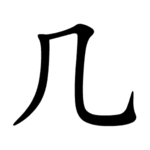Radical 16
Appearance
| 几 | ||
|---|---|---|
| ||
| 几 (U+51E0) "small table" | ||
| Pronunciations | ||
| Pinyin: | jī | |
| Bopomofo: | ㄐ一 | |
| Wade–Giles: | chi1 | |
| Cantonese Yale: | gei1 | |
| Jyutping: | gei1 | |
| Pe̍h-ōe-jī: | kí | |
| Japanese Kana: | キ ki (on'yomi) つくえ tsukue (kun'yomi) | |
| Sino-Korean: | 궤 gwe | |
| Names | ||
| Chinese name(s): | (Surrounding) 几字頭/几子头 jīzìtóu (Bottom) 几字底 jīzìdǐ | |
| Japanese name(s): | 机/つくえ tsukue 几繞/きにょう kinyō 几構/きがまえ/つくえがまえ kigamae/tsukuegamae 風構/かぜがまえ/かざがまえ kazegamae/kazagamae | |
| Hangul: | 안석 anseok | |
| Stroke order animation | ||
 | ||
Radical 16 or radical table (几部), meaning small table, is one of 23 of the 214 Kangxi radicals that are composed of 2 strokes.
几 is also the 16th indexing component in the Table of Indexing Chinese Character Components predominantly adopted by Simplified Chinese dictionaries published in mainland China. 𠘨 is an associated indexing component affiliated to the principal component 几. In addition, the identical character 几 used in Simplified Chinese for 幾 jǐ used to ask "how many" for small amounts or to mean "a few, some, almost, nearly" does not have any historical connection to the "table" character.
Evolution
[edit]-
Chu bamboo and slip script character
-
Shuowen seal script character
-
Liushutong character
Derived characters
[edit]| Strokes | Characters |
|---|---|
| +0 | 几 |
| +1 | 凡 凢 (=凡) 凣 (=凡) |
| +2 | 凤SC (=鳳 -> 鳥) |
| +3 | 凥 処JP (=處 -> 虍) 凧JP |
| +4 | 凨 (=風 -> 風) 凩JP 凪JP 凫SC (=鳧 -> 鳥) |
| +5 | 凬 |
| +6 | 凭 凮 凯SC (=凱) |
| +7 | 巬 |
| +9 | 凰 |
| +10 | 凱 凲 |
| +12 | 凳 凴 (=憑 -> 心) |
Literature
[edit]- Fazzioli, Edoardo (1987). Chinese calligraphy : from pictograph to ideogram : the history of 214 essential Chinese/Japanese characters. calligraphy by Rebecca Hon Ko. New York: Abbeville Press. ISBN 0-89659-774-1.
- Leyi Li: “Tracing the Roots of Chinese Characters: 500 Cases”. Beijing 1993, ISBN 978-7-5619-0204-2
- KangXi: page 133, character 16
External links
[edit]Wikimedia Commons has media related to Radical 016.



